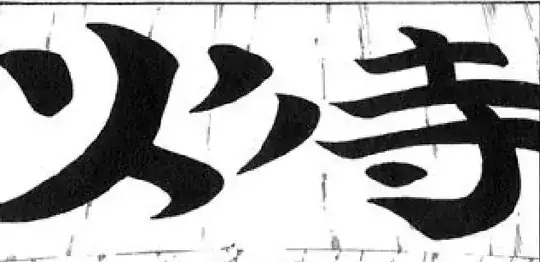Why in this image ノ is written in katakana and not in hiragana?

- 1,032
- 8
- 21
-
5It reads as "火ノ寺" (hi-no-tera), right? Note that Japanese kanas has interchangeable for some reasons, so "ノ" likely used for emphasis there. This usage is similar to some city names which adding katakana between kanji letters. – Tetsuya Yamamoto Jul 12 '17 at 09:03
-
Where is the picture from? – karlalou Jul 12 '17 at 14:05
-
1ケ is used as well, in a smaller version, ヶ. It's used in 市ヶ谷(いちがや), but also sometimes in ~ヶ月, such as 一ヶ月(いっかげつ). – Right leg Jul 12 '17 at 14:08
-
There's also examples like 紀国 or 紀伊国 of 紀伊国屋書店 come to my mind, which completely omit の. – karlalou Jul 12 '17 at 14:12
-
3Related: [Why did の disappear from 山手, but in 御茶ノ水 it's in katakana?](https://japanese.stackexchange.com/q/2931/78) – istrasci Jul 12 '17 at 16:06
-
need time to getting grasp with interchangeable kana in japanese, sometimes we just follow the rule. – evanhutomo Jul 31 '17 at 04:50
2 Answers
の in traditional proper nouns are commonly written in katakana.
Practically, this can help people notice that this の is part of the proper noun and not the ordinary particle.
Historically, hiragana were not much preferred in proper nouns and official documents anyway. Meiji Constitution published in 1889 looked like this. (See: Orthography at the turn of the previous century) There were many katakana-only person names and place names in the old days. For the same reason, I would hardly expect hiragana in nameplates of real temples. Although this 火ノ寺 seems to be the name of a fictional temple, I can say this ノ adds an old and authentic look to the name.
- 285,549
- 12
- 305
- 582
-
By extension, would this mean that names written without kanji are written in katakana instead? – ajsmart Jul 12 '17 at 13:25
-
1@ajsmart Yes, [girl names in particular](http://en.rocketnews24.com/2013/09/19/why-old-japanese-women-have-names-in-katakana/). – naruto Jul 12 '17 at 13:40
-
1Girl names ending with 子 are often written in hiragana except for the 子, such as ふみ子. – Right leg Jul 12 '17 at 14:04
-
-
you should incorporate your comment on girl names to the answer. Comments are too volatile and that info seems relevant. – Mindwin Remember Monica Jul 12 '17 at 15:06
-
I do sense 明治大正 or early 昭和 from the use of カタカナ, and my memory is gradually coming back that ひらがな is considered rather feminin from the ancient time, as used in poetry or literature. I guess it was kanji that was used in official documents in the ancient time, and then with カタカナ. The use of ひらがな in such as 関が原, 湯の島, or 一か所 has newer (and also friendlier to me) feel than 関ケ原, 湯ノ島, 湯之島, 一ヵ所, or 一箇所. – karlalou Jul 13 '17 at 00:51
It is a very difficult question even for Japanese.
I couldn't guess the reasonable reason why it was written as "火ノ寺" specially instead of the ordinary way as "火の寺", though の and ノ are interchangeable as is said in Tetsuya Yamamoto's comment for your question.
So at first, I thought that someone wrote it merely a choice to made their work stand out from other similar works; I know this is not a smart answer.
Next I searched for "火ノ寺" on the Internet. Here and here it was.
It turned out to be a proper noun appeared in The Naruto (Japanese: ナルト) manga and anime series that is a genre of ninja. In addition, there were other similar expressions using ノ instead of の like "木ノ葉 Ko-no-ha" and "木ノ葉丸 Ko-no-ha Maru", they were all proper nouns.
It happens that in naruto's answer there is a reasonable explanation that ノ are often used in traditional proper nouns, and I think it is a pretty promising answer. However, I considered the reason further.
If you are interested in knowing about ninja and know it well, I think that you know to call a woman ninja "くノ一 ku-no-ichi". When you break down a kanji character "女" into strokes, it will become "く, ノ and 一 ku, no and ichi".
I would like to think that ノ in "くノ一" inspired the author who considered the proper nouns in his managa like "火ノ寺 Hi-no-tera", "木ノ葉 Ko-no-ha" and "木ノ葉丸 Ko-no-ha Maru".
- 15,221
- 1
- 15
- 36